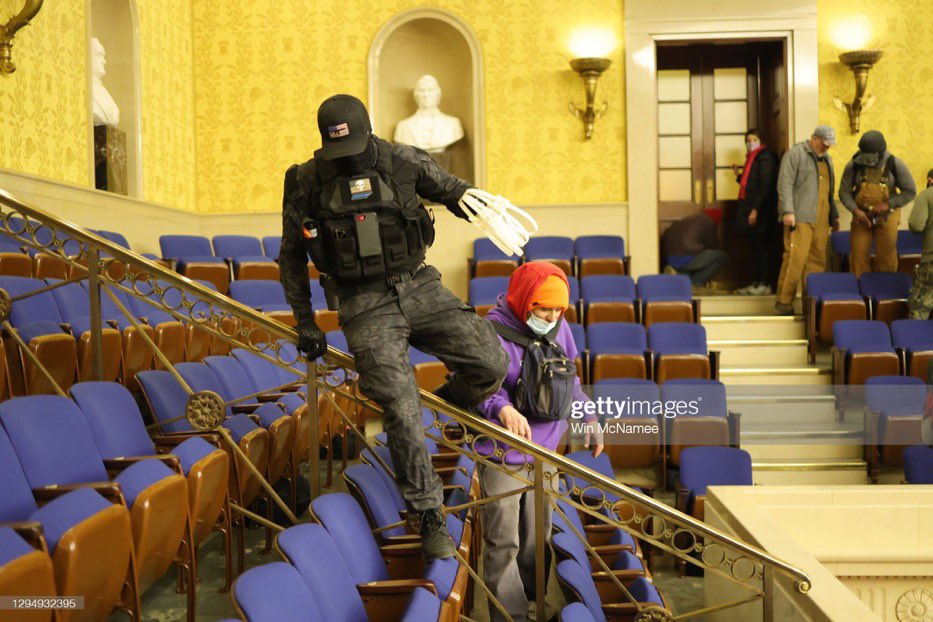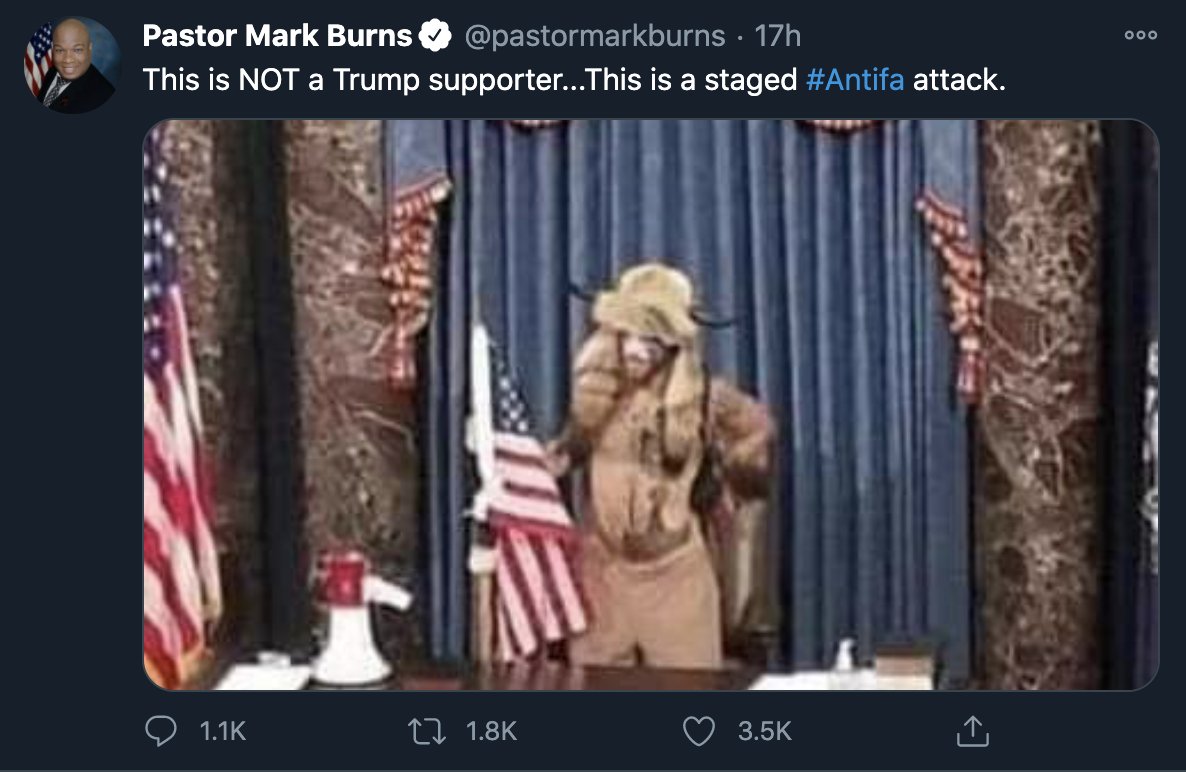
It's been popular for twitterstorians & journalists to suggest that 2016 or 2020 was similar to 1968. Perhaps.
But I'm more concerned about the risk of the 2020s looking like what came after, the 1970s.
But I'm more concerned about the risk of the 2020s looking like what came after, the 1970s.
The 1970s have been kind of lost down the cultural memory hole, especially the level of political violence. There's a reason that Philip Jenkins's excellent book on the period is titled "Decade of Nightmares."
amazon.com/Decade-Nightma…
amazon.com/Decade-Nightma…
For example, crimes that today would be exceptional were then quite normal. Plane hijackings boomed, with more hijackings in single *years* of the 70s as in the last two *decades* combined.
We're talking ~7 hijackings a month!
We're talking ~7 hijackings a month!
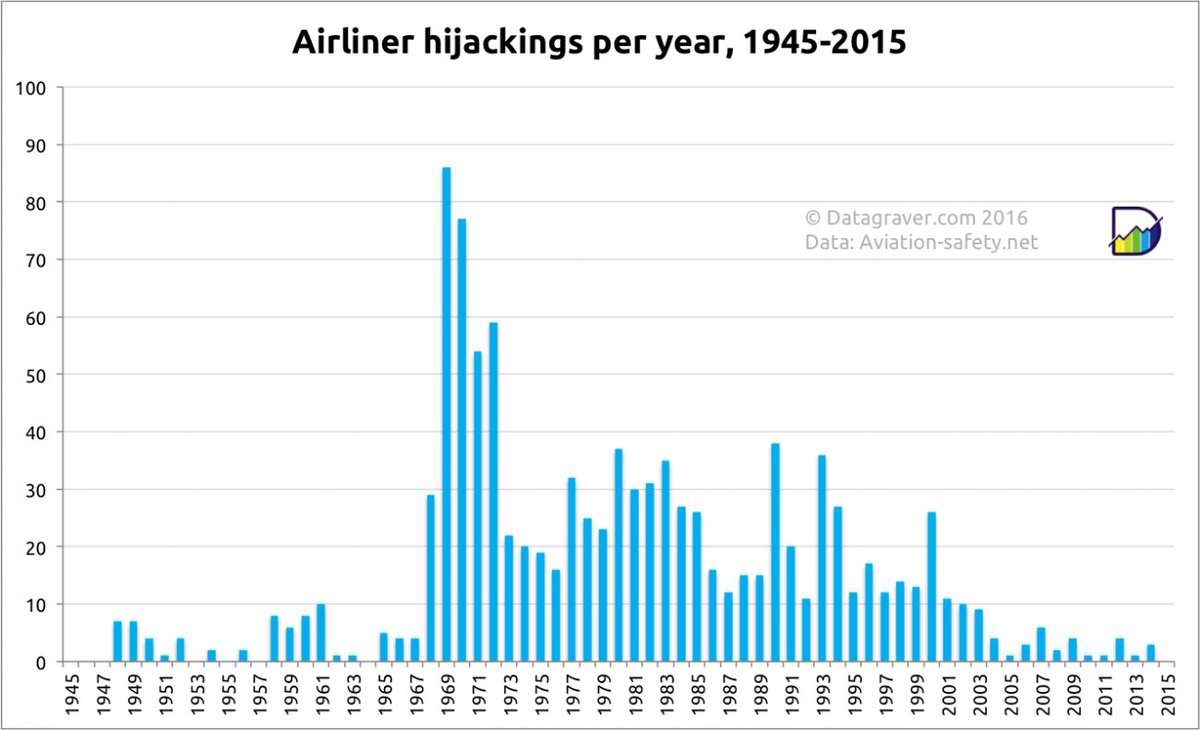
Or consider the base line rate of terror attacks by political groups. Most charts you'll find online--like the one on the left--start in the 90s & look like a hockey stick.
But go back to the 70s, and the curve looks quite different.

But go back to the 70s, and the curve looks quite different.
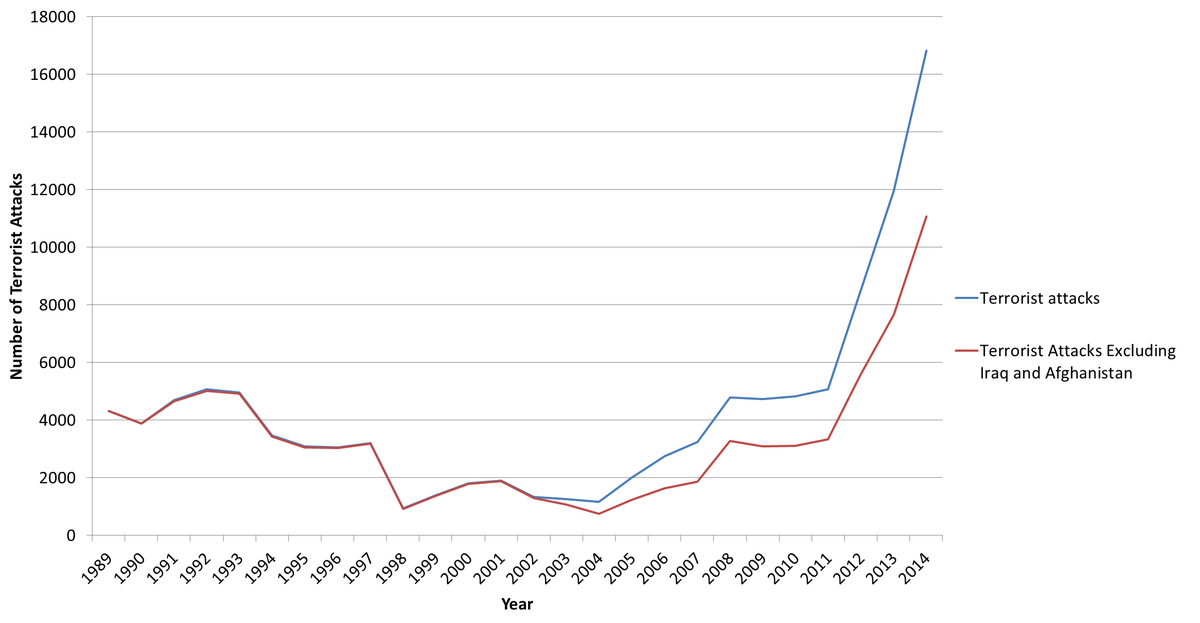
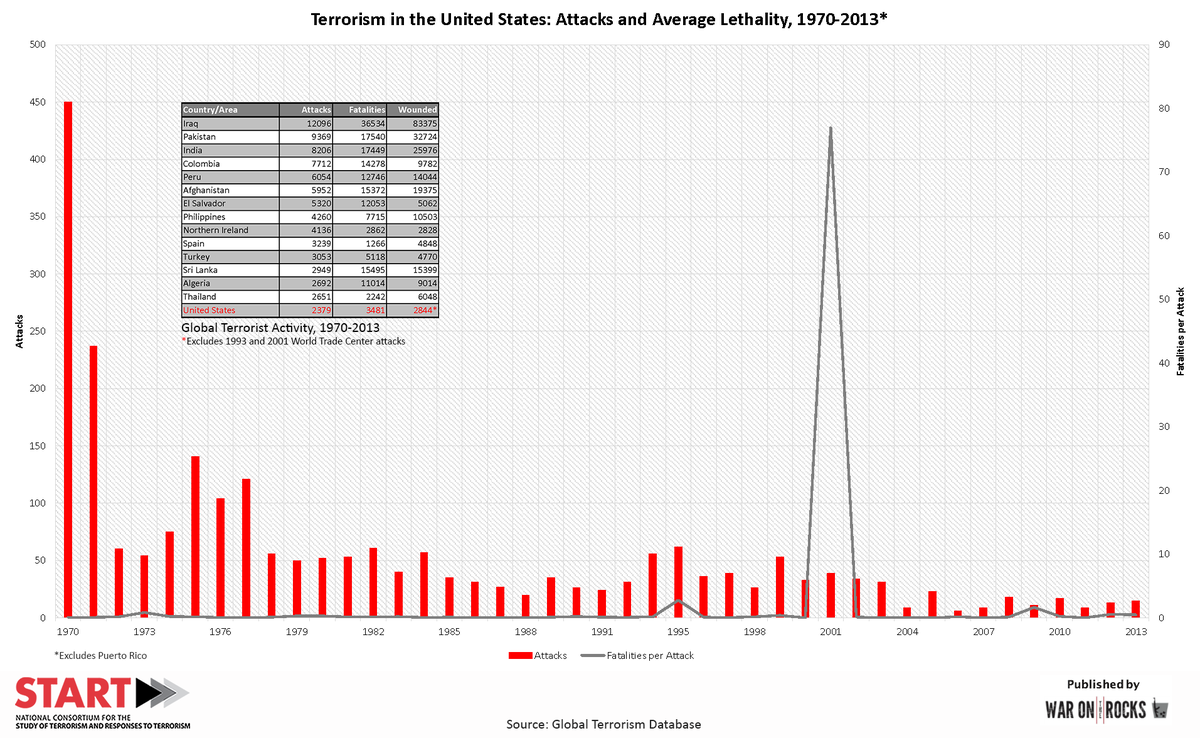
I used to ask my students in class which group do they think was responsible for more terror attacks in the US since 1970 than any other.
Some guess religious extremists, others the Klan, but they are always surprised to find out that it was:
Puerto Rican nationalists.
Some guess religious extremists, others the Klan, but they are always surprised to find out that it was:
Puerto Rican nationalists.
In the 1970s, you could name pretty much any political movement and there was a militant wing of it actively blowing people up, from environmentalists to the Weather Underground to white supremacists.
Why did that happen and what could that mean for today?
It was a crisis of trust in institutions (and not without cause). Scandals like Watergate, the Pentagon Papers, COINTELPRO, and many more taught Americans that the government, corporations, & the media couldn't be trusted.
It was a crisis of trust in institutions (and not without cause). Scandals like Watergate, the Pentagon Papers, COINTELPRO, and many more taught Americans that the government, corporations, & the media couldn't be trusted.
This shows up in a wave of conspiracy movies in the 70s like "Three Days of the Condor", in which a literary organization is actually a CIA front and neither the government, corporate America, or the media can be trusted to tell the truth. 
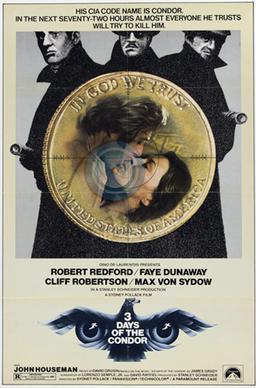
You can see it to in the number of people who believe in conspiratorial explanations rather than the government line on things like the Kennedy assassination. Note the exogenous boom in disbelief in the 70s. 
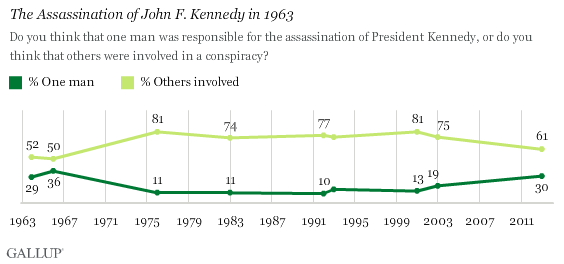
Why would a decline in institutional trust lead to political violence?
Because a healthy civic sphere and non-violent political discourse are predicated on the belief that most participants sincerely seek the well-being of the community (even if they sometimes get it wrong).
Because a healthy civic sphere and non-violent political discourse are predicated on the belief that most participants sincerely seek the well-being of the community (even if they sometimes get it wrong).
But what if some participants, especially those from the "other side" or those with institutional power, aren't playing fair? If they are lying to the American people, if they are committing crimes and covering them up?
All bets are off.
All bets are off.
People revert to atavistic forms of political engagement, which is a fancy way of saying that violence becomes an increasingly tolerable tool for extracting political concessions.
Which is why so many of the relatively peaceful social movements of the 1960s have a more militant expression in the 1970s (at least on the margins), eg SDS to Weather Underground, CORE/SCLC/etc to Black Panthers, Rachel Carson to E.L.F.
And this is something that keeps me up at night in 2021. We are seeing signs everywhere of declining institutional trust (again, not without cause).
We've seen a decline of trust in mass media.
We've seen a decline of trust in mass media.
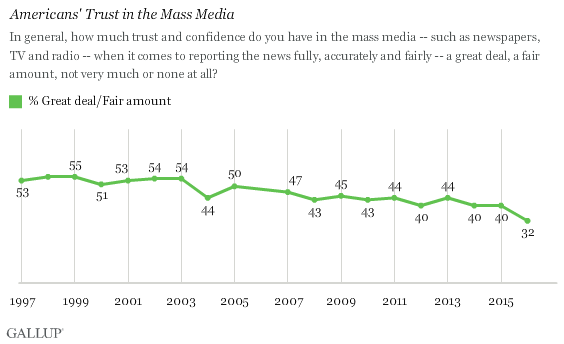
The last time trust in the good intentions of the federal government was this low was...the 70s and early 90s.
And remember what happened in the 90s in re anti-government terrorism? Oklahoma City, the militia movement, abortion clinic bombings, etc.
And remember what happened in the 90s in re anti-government terrorism? Oklahoma City, the militia movement, abortion clinic bombings, etc.
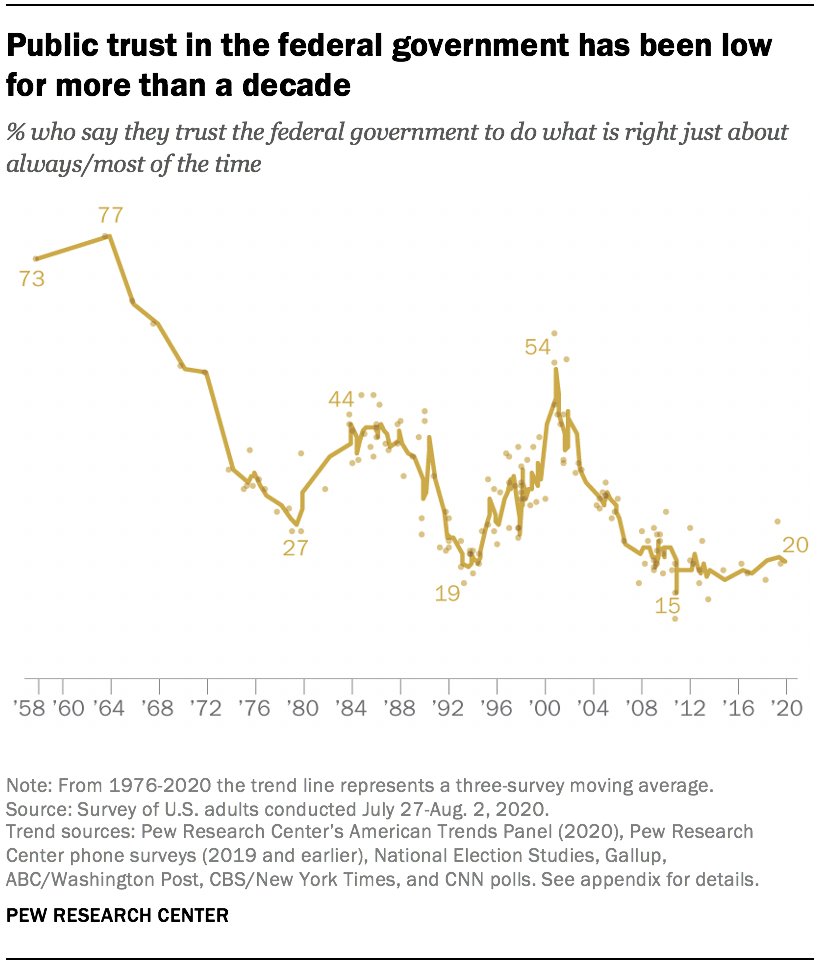
The typical Democrat or Republican has an increasingly negative view of members of the other party.
Again, when you stop thinking the "other side" plays by the rules, then you don't feel like you have to play by them either.
Again, when you stop thinking the "other side" plays by the rules, then you don't feel like you have to play by them either.
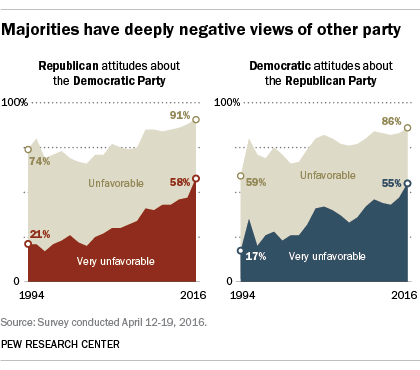
These are all canaries in the coal mine. Institutional trust is declining to historic lows, which are precisely the eras when political violence tends to rise.
Jan 6th has made people worry about what could happen on Jan 20th, and for good reason. But I fear that doesn't extend the concern far enough.
The insurrectionists believed that Democrats had stolen the election and that Mike Pence and Congress were going to go along with it.
The insurrectionists believed that Democrats had stolen the election and that Mike Pence and Congress were going to go along with it.
That is *precisely* the way that institutional distrust--in this case in the political parties, a branch of government, and the media that they blame for supporting the steal--leads to violence.
Storming the Capitol--an unprecedented move in US history--was now on the table.
Storming the Capitol--an unprecedented move in US history--was now on the table.
And if *that* is on the table, what isn't?
Think of Jan 6th as the first installment of the 2020s as a new "decade of nightmares," not as a book end for the Trump regime.
Think of Jan 6th as the first installment of the 2020s as a new "decade of nightmares," not as a book end for the Trump regime.
• • •
Missing some Tweet in this thread? You can try to
force a refresh


